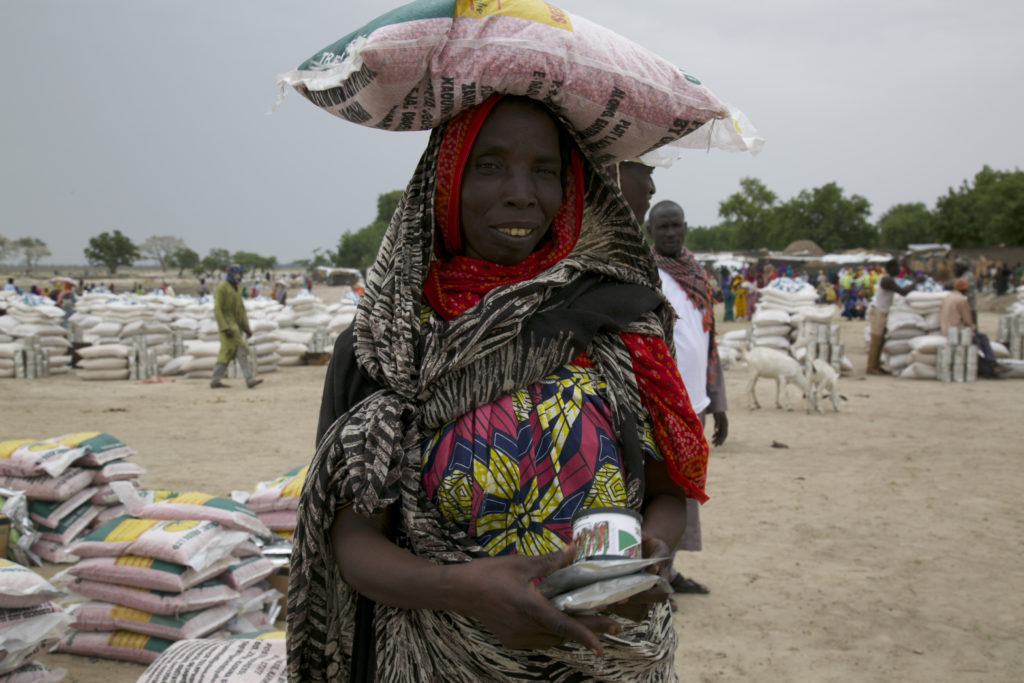By Samuel Oyejola
A joint effort by United Nations agencies to ensure food security in the north-east region of Nigeria may set the crisis ridden region on the part to food security and self reliance. Food and Agricultural organization, FAO and World Food Programme, WFP are primarily joined by the intention to reduce dependence on food assistance and at the same time increase food production in the region.
FAO is providing seed and fertilizer to produce up to eight months’ worth of food during the 2018 rainy season while WFP provides the food needs of households all through the planting period.
Rann, a village in Borno state close to the Cameroonian border had its share of the insecurity and humanitarian crisis that rocked the region. Rann is where Fanna Kachella lives with her husband and their eight children. They are both keen to resume farming with the support of FAO and WFP.
While FAO provide seeds and fertilizers to over 10,000 households in Rann who have safe access to land and have proved capable of growing food through a community-based assessment, WFP provides food and cash donation to support these households all through the planting season.
Fanna, her husband and their eight children including other 1.2 million Nigerians benefit monthly from food and cash assistance of the WFP in Borno, Adamawa and Yobe states of the North-East Nigeria.
“Not having anything much to do has been hard for us,” Fanna said, “we are used to planting our own food. I hope we will get a good harvest from the seed.”
Farmers in Rann and more than 30 other locations can plant maize, sorghum, millet and cowpeas following the distributions. In most places, they also received sesame, groundnuts, sweet pepper and watermelon seed for income generation.
Altogether, FAO and WFP are supporting around 600,000 conflict-affected persons in Borno, Adamawa and Yobe states in northeastern Nigeria during the rainy season.
“Families in northeast Nigeria have been affected by conflict for nine years, and many have gone through terrible times. We need to work harder and together to put people back on the track of self-reliance, to rebuild their livelihoods and to restore their dignity. This joint assistance by FAO and WFP is a step in that direction,” said WFP Representative in Nigeria, Myrta Kaulard.
“FAO is assisting both the growing number of farmers who have returned to their villages to resume production, as well as the many still forced to live in camps,” said FAO Representative in Nigeria, Suffyan Koroma.
“In addition to distributing inputs like seed, we are expanding our farmer field school and savings and loans programmes in the region to strengthen both farming skills and access to finance for agri-business development,” he added.
The “Twin Track” approach is expected to assist over 1 million people overcome food insecurity and be self-reliant in food production through farming.
FAO said it is currently distributing disease and drought-tolerant varieties of crop seed and fertilizer using a kit system. FAO provides three different kits with various seeds and fertilizer for farmers in the region.
In Kit 1, maize, millet or sorghum alongside cowpea seed and fertilizer. Kits 2 and 3 that are solely for women-headed households contain vegetable and cash crop seeds respectively. The vegetable kit features okra and amaranth, a green leafy vegetable, while kit 3 contains income-boosting groundnut and sesame relished by women for their good market prices.
To prevent malnutrition, WFP distribute specialized food to around 200,000 young children and almost 150,000 pregnant or breastfeeding women every month. To assist the most food insecure and vulnerable Nigerians the agency said it urgently requires $49 million to continue lifesaving support until the end of 2018 while FAO needs $18.3 million to help farmers like Fanna Kachalla and her husband recover from the impact of the conflict in the region.

